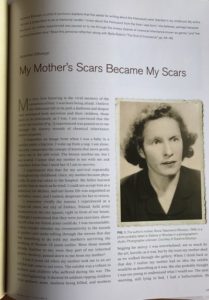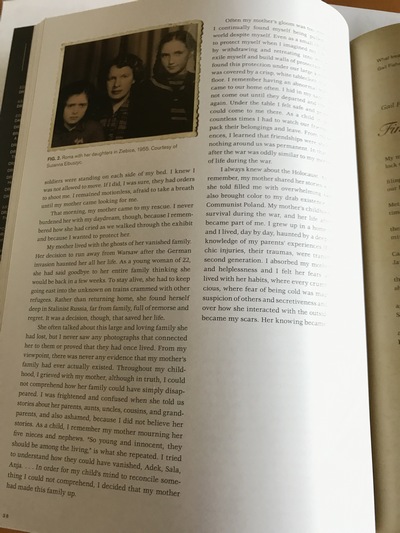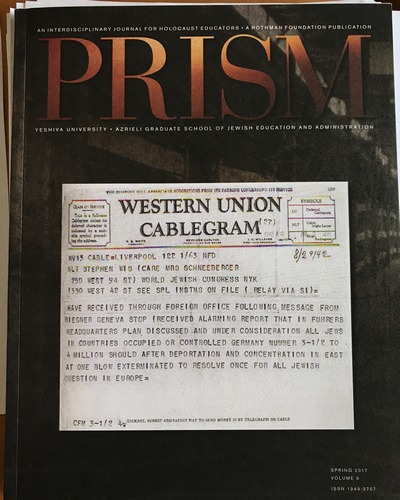Crossing Paths with Elie Wiesel. The importance of Holocaust survivors’ stories.
https://suzannaeibuszyc.substack.com/p/crossing-paths-with-elie-wiesel
Jewish History in Poland Ended. The enormity of what happened; the long Jewish history in Poland was forever severed. https://suzannaeibuszyc.substack.com/p/jewish-history-in-poland-ended
The diverse and resolute Polish Jewish Community after WWI. We owe our existence to those who came before us. https://suzannaeibuszyc.substack.com/p/the-diverse-and-resolute-polish-jewish
Surviving in Stalin’s Russia ironically proved to be for Polish Jews the single best way to escape the catastrophe that engulfed them in Nazi occupied Europe. https://suzannaeibuszyc.substack.com/p/surviving-in-stalins-russia-during
Poland, Jews and the Interwar Period. Jews had few rights no matter where they lived in the world. https://suzannaeibuszyc.substack.com/p/poland-jews-and-the-interwar-period
Surviving in Stalin’s Russia During WWII (Białystok and Saratov period) https://suzannaeibuszyc.substack.com/p/surviving-in-stalins-russia-during
My mother and I are immigrants. At the time we immigrated, in the late 1960s, America imposed strict immigration laws and screened against any communist associations or sympathies. http://blogs.timesofisrael.com/stories-told-by-real-people/
After the war, my mother pondered deeply, however, admitting to herself that a system of convictions she held so dear turned out to be deceptions was intolerable.
http://blogs.timesofisrael.com/poland-the-cradle-to-poles-of-jewish-faith-and-orthodox-jews/
Crossing Paths with Professor Elie Wiesel. Let us travel back in time, to where I lived, after the war. To the southwestern corner of dreary communist Poland where Polish Jewish citizens….. http://blogs.timesofisrael.com/crossing-paths-with-professor-elie-wiesel/
In the last decade, before her death, my mother became progressively distraught. It was the knowledge that she was running out of time of ever finding out the truth….
http://blogs.timesofisrael.com/what-will-it-take-for-our-people-to-stop-living-in-denial/
The Pessimists Fled and the Optimists Stayed Behind. This expression comes to mind when looking at my own parents and survivors like them who ended up among the living. http://blogs.timesofisrael.com/the-pessimists-fled-and-the-optimists-stayed-behind/
For our family there exists only one photograph from before WWII. That of my father and his cousin/fiancée, taken in their city of Lodz.
http://blogs.timesofisrael.com/may-their-memory-live-on-forever/
The French Philosopher Emmanuel Levinas and his notion of ethics and relation as determined by the encounter with the other comes to mind.
http://blogs.timesofisrael.com/in-poland-after-the-war-it-was-how-others-saw-us-and-not-how-we-saw-ourselves/
Out of Warsaw, with tradition and trauma. Deconstructive ‘faith’ argues that faith without critique amounts to unverified belief.
http://blogs.timesofisrael.com/deconstructive-faith-argues-that-faith-without-critique-amounts-to-unverified-belief/
My mother’s family in Warsaw after WWI observed strict Sabbath and celebrated all the other Jewish holidays, yet they dressed in the Western-European fashion.
http://blogs.timesofisrael.com/life-in-poland-after-wwi-orthodox-jews-and-poles-of-jewish-faith/
At the end of November of 1939, after traveling separately, my mother from Warsaw and my father from Lodz they had arrived in Bialystok.
http://blogs.timesofisrael.com/a-harsh-exile-in-russia-proved-to-be-for-polish-jews-the-answer-for-escaping-the-catastrophe-that-engulfed-europe-during-wwii/
What I remember most vividly from my childhood years after the war in Poland is how my mother always watched the door, always hopeful, never giving up that a loved one would enter, come back from the dead.
http://blogs.timesofisrael.com/my-father-hid-behind-a-wall-of-silence-my-mother-did-not-stop-talking/
“There Is No End to Holocaust Stories” by Suzanna Eibuszyc
https://www.smashwords.com/books/view/715848
“Crossing Paths with Professor Elie Wiesel” by Suzanna Eibuszyc
https://www.smashwords.com/books/view/720103
PRISM, Journal for Holocaust Educators
Spring 2017, Volume 9, ISSN 1949-2707
“My Mother’s Scars Became My Scars”
![]()



My mother and I are immigrants. At the time we immigrated, in the late 1960s, America imposed strict immigration laws and screened against any communist associations or sympathies. http://blogs.timesofisrael.com/stories-told-by-real-people/
After the war, my mother pondered deeply, however, admitting to herself that a system of convictions she held so dear turned out to be deceptions was intolerable.
http://blogs.timesofisrael.com/poland-the-cradle-to-poles-of-jewish-faith-and-orthodox-jews/
Crossing Paths with Professor Elie Wiesel. Let us travel back in time, to where I lived, after the war. To the southwestern corner of dreary communist Poland where Polish Jewish citizens….. http://blogs.timesofisrael.com/crossing-paths-with-professor-elie-wiesel/
In the last decade, before her death, my mother became progressively distraught. It was the knowledge that she was running out of time of ever finding out the truth….
http://blogs.timesofisrael.com/what-will-it-take-for-our-people-to-stop-living-in-denial/
The Pessimists Fled and the Optimists Stayed Behind. This expression comes to mind when looking at my own parents and survivors like them who ended up among the living. http://blogs.timesofisrael.com/the-pessimists-fled-and-the-optimists-stayed-behind/
For our family there exists only one photograph from before WWII. That of my father and his cousin/fiancée, taken in their city of Lodz.
http://blogs.timesofisrael.com/may-their-memory-live-on-forever/
The French Philosopher Emmanuel Levinas and his notion of ethics and relation as determined by the encounter with the other comes to mind.
http://blogs.timesofisrael.com/in-poland-after-the-war-it-was-how-others-saw-us-and-not-how-we-saw-ourselves/
Out of Warsaw, with tradition and trauma. Deconstructive ‘faith’ argues that faith without critique amounts to unverified belief.
http://blogs.timesofisrael.com/deconstructive-faith-argues-that-faith-without-critique-amounts-to-unverified-belief/
My mother’s family in Warsaw after WWI observed strict Sabbath and celebrated all the other Jewish holidays, yet they dressed in the Western-European fashion.
http://blogs.timesofisrael.com/life-in-poland-after-wwi-orthodox-jews-and-poles-of-jewish-faith/
At the end of November of 1939, after traveling separately, my mother from Warsaw and my father from Lodz they had arrived in Bialystok.
http://blogs.timesofisrael.com/a-harsh-exile-in-russia-proved-to-be-for-polish-jews-the-answer-for-escaping-the-catastrophe-that-engulfed-europe-during-wwii/
What I remember most vividly from my childhood years after the war in Poland is how my mother always watched the door, always hopeful, never giving up that a loved one would enter, come back from the dead.
http://blogs.timesofisrael.com/my-father-hid-behind-a-wall-of-silence-my-mother-did-not-stop-talking/